MercoPress. South Atlantic News Agency
Tag: World Health Organization (WHO)
-
Tuesday, December 12th 2017 - 21:04 UTC
Universal health coverage is a fundamental human right
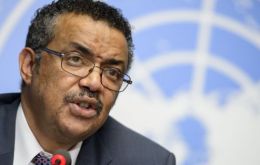
“The enjoyment of the highest attainable standard of health is one of the fundamental rights of every human being without distinction of race, religion, political belief, economic or social condition”, said Dr Tedros Adhanom Ghebreyesus, WHO Director-General.
-
Wednesday, November 29th 2017 - 06:15 UTC
One in ten medical products in developing countries is substandard or falsified
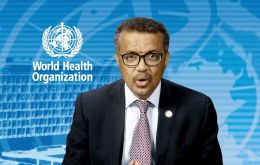
An estimated one in ten medical products circulating in low- and middle-income countries is either substandard or falsified, according to new research from the World Health Organization (WHO). This means that people are taking medicines that fail to treat or prevent disease.
-
Saturday, November 25th 2017 - 23:39 UTC
Yellow fever cases re-emerge in the Brazilian state of Sao Paulo
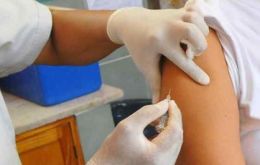
Between July and mid-October 2017, a total of 71 suspected yellow fever cases were reported in São Paulo State, Brazil. Of these, two were confirmed, six are under investigation, and 63 were ruled out.
-
Friday, November 10th 2017 - 17:35 UTC
WHO, FAO and OIE call for responsible use of antibiotics in humans and animals

In the lead-up to World Antibiotic Awareness Week (13-19 November 2017), the Food and Agriculture Organization of the United Nations (FAO), the World Health Organization (WHO) and the World Organisation for Animal Health (OIE) are together calling for responsible use of antibiotics in humans and animals to reduce the emergence of antibiotic resistance.
-
Wednesday, November 8th 2017 - 18:30 UTC
Stop using antibiotics in healthy animals to prevent the spread of resistance, warns WHO
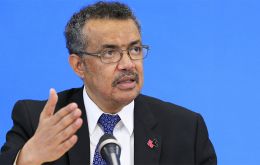
The World Health Organization is recommending that farmers and the food industry stop using antibiotics routinely to promote growth and prevent disease in healthy animals.
-
Monday, October 23rd 2017 - 05:29 UTC
WHO Director General rescinds Goodwill Ambassador appointment

World Health Organization, Dr. Tedros Adhanom Ghebreyesus has announced that after much listening and reflection, he has decided to rescind the appointment of Zimbabwe president Robert Mugabe as a WHO Goodwill Ambassador for NCDs in Africa.
-
Wednesday, September 20th 2017 - 22:01 UTC
The world is running out of antibiotics, WHO report confirms

A report – Antibacterial agents in clinical development – an analysis of the antibacterial clinical development pipeline, including Mycobacterium tuberculosis – launched on Tuesday by the World Health Organization (WHO) shows a serious lack of new antibiotics under development to combat the growing threat of antimicrobial resistance.
-
Friday, July 28th 2017 - 06:04 UTC
World Hepatitis Day: 325 million affected; annual deaths exceed those linked to HIV
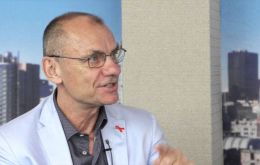
New World Health Organization, WHO, data from 28 countries - representing approximately 70% of the global hepatitis burden - indicate that efforts to eliminate hepatitis are gaining momentum. Published to coincide with World Hepatitis Day, the data reveal that nearly all 28 countries have established high-level national hepatitis elimination committees and more than half have allocated dedicated funding for hepatitis responses.
-
Friday, July 7th 2017 - 17:22 UTC
WHO warns about the spread of gonorrhea, and failure of antibiotics

Oral sex is producing dangerous gonorrhea and a decline in condom use is helping it to spread, the World Health Organization says. It is warning that if you contract gonorrhea, it is now much harder to treat and in some cases impossible.
-
Wednesday, May 31st 2017 - 05:52 UTC
World No Tobacco Day 2017: for health, prosperity, the environment and national development

Action to stamp out tobacco use can help countries prevent millions of people falling ill and dying from tobacco-related disease, combat poverty and, according to a first-ever WHO report, reduce large-scale environmental degradation.
